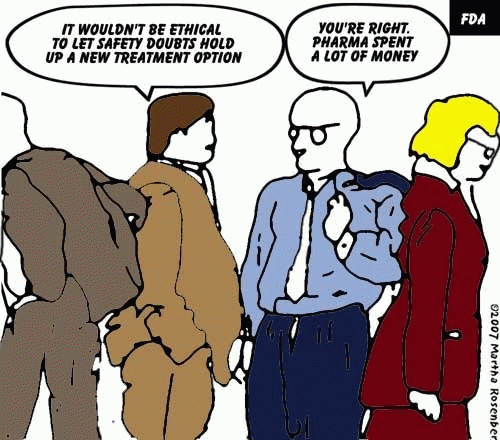"Never mind" said the Obama administration in March after its proposal to limit automatic Medicare coverage of pricey depression and psychiatric drugs was met with a Pharma funded backlash. It apparently wasn't worth it as "patients" on the Hill yelled "You're going to limit WHAT?" and
won.
As private insurers balk at paying
as much a month as $830 for Abilify, $250 for Seroquel, $450 for Geodon and $760 for Invega, Pharma increasingly relies on government programs to subsidize its expensive psychiatric drug habit. At
least 16 states pursued legal action in 2008 against similar profiteering in Medicaid programs (which included Texas Medicaid paying $557,256 for two months of pediatric Geodon which was not even
approved for children.)
That is no doubt why in February the Obama administration sought to limit the "protected status" of expensive categories of brand name pills which account for as much as
33 percent of total outpatient drug spending under Part D of Medicare.
Siphoning expensive psychiatric drugs, many of which are unnecessary or have cheaper alternatives, through government programs has been Big Pharma's marketing plan for over a decade. In Texas, a Medicaid "decision tree" called the Texas Medical Algorithm Project
was instituted that literally
requires doctors to prescribe the newest psychiatric drugs first. Ka-ching. It was--surprise--funded by the Johnson & Johnson linked Robert Wood Johnson Foundation.
Big Pharma also uses patient front groups to scream about the need for expensive drugs when alternative drugs exist. "When insurers balk at reimbursing patients for new prescription medications, these groups typically swing into action, rallying sufferers to appear before public and consumer panels, contact lawmakers, and provide media outlets a human face to attach to a cause,"
writes Melissa Healy of the
Los Angeles Times about their tactics
.Many of the groups have been probed by Congress for their undisclosed industry backing including the Depression and Bipolar Support Alliance, which gets half its
funding from Pharma, Mental Health America, the National Alliance for Research on Schizophrenia and Depression and the
National Alliance on Mental Illness (NAMI). NAMI, perhaps the best known group, received
$23 million in just two years from Pharma and draws as much as
75 percent of its donations from drug companies. No wonder NAMI led the fight against last month's Obama proposal saying it "undermines a key protection for some of the sickest, most vulnerable Medicare beneficiaries. " NAMI lobbyist Andrew Sperling also said, "You get much better outcomes when a doctor can work with patients to figure out which medications will work best for them, " in a plug for drugs which happen to cost several hundred dollars a prescription.
The issue is not just Pharma looting taxpayer dollars. Many of the newer psychiatric drugs are not better than the older, less expensive drugs and are actually
less safe. One chilling example is the overuse of deadly antipsychotic drugs in nursing homes. An estimated 15,000 nursing home residents
die a year FDA drug reviewer David Graham, MD told a congressional panel in 2007 from inappropriately given antipsychotic medications! Antipsychotics like Seroquel carry warnings that they cause death in elderly people who have dementia but are nevertheless in wide use in many geriatric, federally-supported facilities. So much for "patient choice." So much for NAMI's concern for "the sickest, most vulnerable Medicare beneficiaries. "
(Article changed on May 4, 2014 at 03:20)






